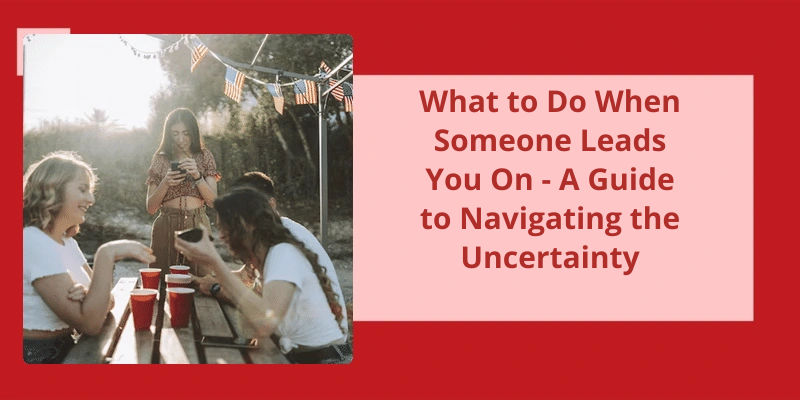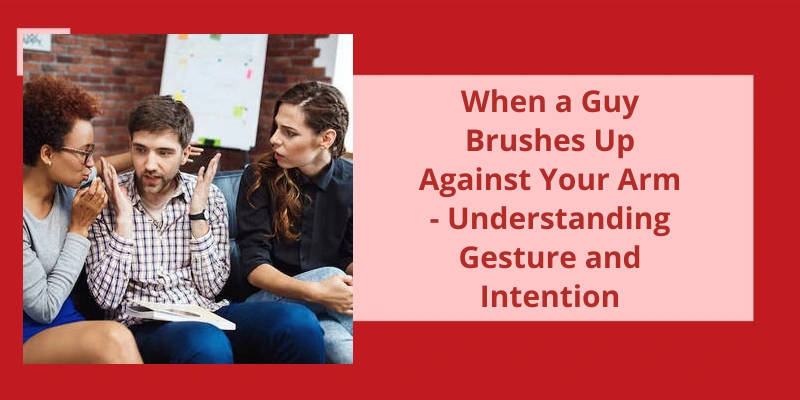Navigating the world of modern dating can sometimes feel like a complicated and confusing game. It's not uncommon to encounter people who appear interested in us, only to suddenly lose interest or even disappear altogether. This can be incredibly frustrating, especially when we've invested time, energy, and emotions into building a connection with someone. Being led on can leave us feeling disappointed, hurt, and confused about how to move forward. But there's no need to despair. By taking a few key steps, we can learn to cope with situations like this in healthy and constructive ways. Here are 15 tips on how you can deal with someone leading you on.
What Does Leading Someone on Mean?
Leading someone on is a form of emotional manipulation, where an individual intentionally entices or misleads another person into thinking that there’s a romantic interest. People who lead others on often do so for personal gain, to boost their ego or for entertainment purposes. What’s most concerning about leading someone on isn’t only the emotional distress it causes to the deceived individual but also the impact it can have on their self-esteem and sense of self-worth.
Often, people who lead others on are insecure or trying to compensate for their own shortcomings. They may lack the confidence to form genuine relationships or struggle with intimacy and vulnerability.
It’s essential to recognize the signs of someone leading you on, as it can be challenging to distinguish between genuine interest and someone who’s only playing games. One way to test whether someone is leading you on is to slow down the relationships pace. If the other person continues to express interest, it’s most likely a genuine connection. However, if the other person suddenly loses interest or becomes distant, it could be a sign that they were only leading you on.
People who lead others on often do so for personal gain and lack the self-confidence to form genuine relationships. It’s essential to recognize the signs of someone leading you on and take steps to protect yourself from emotional harm. If you suspect that someone is leading you on, it’s better to confront them and seek closure rather than continuing to invest your time and emotions into the relationship.
Tips for Confronting Someone Who Is Leading You On
Confrontation is never an easy task, but it can be especially challenging when dealing with someone who’s leading you on. It’s important to be clear and direct about how their behavior is affecting you and what you expect from them. Be respectful and avoid accusations. Listen to their response, but also trust your instincts and be prepared to distance yourself if necessary. Remember that you deserve honesty and respect in any relationship.
In relationships, clarity and honesty are essential to avoid hurting the other person’s feelings intentionally or unintentionally. Leading someone on can create false hopes and expectations that ultimately end up in disappointment and heartbreak. It’s crucial to understand the impact of our actions on others and to be self-aware of our intentions.
Is It Cruel to Lead Someone On?
It’s important to remember that leading someone on can have serious emotional consequences for the person being led on. They may develop feelings for the other person and invest time and energy into the relationship, only to find out that the other person was not interested in anything more than physical gratification or attention. This can lead to feelings of hurt, rejection, and betrayal.
It’s also important to consider the motives behind leading someone on. Is it to boost your ego or feel wanted? If so, it’s important to address the underlying insecurities that drive this behavior. It may be uncomfortable to confront these issues, but it’s a necessary step in avoiding hurtful behavior.
There may also be societal pressures that contribute to the desire to lead someone on, such as the expectation that people should be in relationships or have sexual experiences. It’s important to remember that it’s okay to not be interested in pursuing a romantic relationship or engaging in sexual activity.
If someone isn’t interested in pursuing a relationship, it’s important to be clear about that from the beginning. This may be uncomfortable, but it’s better than leading someone on and causing them emotional pain in the long run. Communication is key in any relationship, and being honest about expectations and intentions can prevent hurt feelings and misunderstandings.
It’s important to address any underlying insecurities that drive this behavior and be clear about intentions from the beginning of any relationship. Open communication and honesty can help prevent hurt feelings and misunderstandings.
The Difference Between Leading Someone on and Simply Being Friendly or Flirty
- Leading someone on involves making them believe that you’re interested in a romantic or sexual relationship when you’re not.
- Simply being friendly or flirty doesn’t necessarily imply romantic or sexual interest.
- It’s important to communicate your intentions clearly to avoid leading someone on.
- Leading someone on can be hurtful and damaging to their emotions and self-esteem.
- It’s always better to be honest and upfront about your intentions, even if it may be uncomfortable in the short term.
Source: Is it OK to lead someone on then leave them for …
When you’re in a new relationship or just starting to get to know someone, it can be difficult to tell if they’re leading you on or if they’re genuinely interested in you. However, there are certain subtle signs to look out for that can give you a clue into their true intentions. Here are five signs to keep in mind that can help you spot if someone is leading you on early on in the relationship.
How Can You Tell if Someone Is Leading You On?
When you find yourself falling for someone new, it can be difficult to know whether they’re truly interested in you or just leading you on. It’s important to be able to spot the signs early on, so that you don’t waste your time on someone who’s never going to be serious about you.
One of the most common signs of someone leading you on is that they’re great when you’re alone together, but as soon as you’re out in public, they suddenly become cold and distant. This kind of behavior suggests that they may not be interested in pursuing a real relationship with you, but are simply using you for their own pleasure.
Another telltale sign that someone is leading you on is that they’re very flaky. They make plans with you, but then cancel at the last minute or fail to follow through with what they promised they’d do. This kind of behavior is disrespectful and shows that they aren’t serious about building a real relationship with you.
If you find yourself in a situation where you’re constantly asking direct questions about the state of the relationship, and the person you’re talking to consistently avoids answering those questions, it’s a clear sign that they’re leading you on. They may be avoiding the subject because they simply don’t feel the same way as you do.
Another sign that someone is leading you on is that they’re very sporadic in their contact with you. They may go days or even weeks without contacting you at all, and then suddenly pop back up as if nothing has happened. This kind of behavior is a clear red flag, and suggests that they aren’t really interested in pursuing anything serious with you.
Finally, if your gut is telling you that something isn’t right, it’s important to listen to that feeling. Our intuition is often our best guide when it comes to matters of the heart, and if you feel like you’re being misled or led on, it’s important to trust that instinct. Ultimately, the most important thing is to be honest with yourself about what you want and what you’re willing to accept from someone else.
Conclusion
When someone leads you on, it can be easy to feel discouraged and even heartbroken. However, it’s important to remember that you’re in control of your own actions and emotions. Instead of dwelling on the past or obsessing over what could have been, focus on moving forward. This can mean blocking and deleting the person, seeking advice from trusted sources, finding joy in activities that bring you happiness, and solidifying what you want in a partner. Don't be afraid to be alone and take your time before moving on. Surround yourself with a supportive network of friends who’ll lift you up and encourage you to stay positive. Remember, you deserve someone who’ll treat you with the love and respect you deserve.






